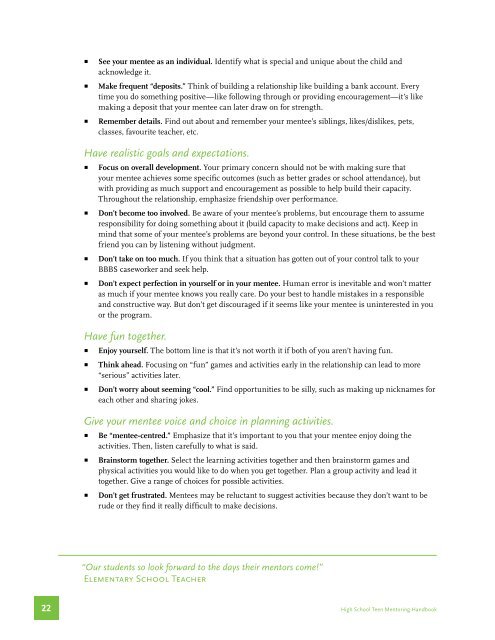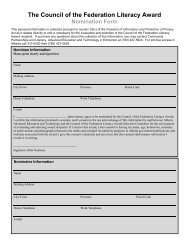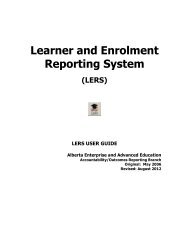High School Teen Mentoring Handbook - Enterprise and Advanced ...
High School Teen Mentoring Handbook - Enterprise and Advanced ...
High School Teen Mentoring Handbook - Enterprise and Advanced ...
- No tags were found...
You also want an ePaper? Increase the reach of your titles
YUMPU automatically turns print PDFs into web optimized ePapers that Google loves.
• See your mentee as an individual. Identify what is special <strong>and</strong> unique about the child <strong>and</strong>acknowledge it.• Make frequent “deposits.” Think of building a relationship like building a bank account. Everytime you do something positive—like following through or providing encouragement—it’s likemaking a deposit that your mentee can later draw on for strength.• Remember details. Find out about <strong>and</strong> remember your mentee’s siblings, likes/dislikes, pets,classes, favourite teacher, etc.Have realistic goals <strong>and</strong> expectations.• Focus on overall development. Your primary concern should not be with making sure thatyour mentee achieves some specific outcomes (such as better grades or school attendance), butwith providing as much support <strong>and</strong> encouragement as possible to help build their capacity.Throughout the relationship, emphasize friendship over performance.• Don’t become too involved. Be aware of your mentee’s problems, but encourage them to assumeresponsibility for doing something about it (build capacity to make decisions <strong>and</strong> act). Keep inmind that some of your mentee’s problems are beyond your control. In these situations, be the bestfriend you can by listening without judgment.• Don’t take on too much. If you think that a situation has gotten out of your control talk to yourBBBS caseworker <strong>and</strong> seek help.• Don’t expect perfection in yourself or in your mentee. Human error is inevitable <strong>and</strong> won’t matteras much if your mentee knows you really care. Do your best to h<strong>and</strong>le mistakes in a responsible<strong>and</strong> constructive way. But don’t get discouraged if it seems like your mentee is uninterested in youor the program.Have fun together.• Enjoy yourself. The bottom line is that it’s not worth it if both of you aren’t having fun.• Think ahead. Focusing on “fun” games <strong>and</strong> activities early in the relationship can lead to more“serious” activities later.• Don’t worry about seeming “cool.” Find opportunities to be silly, such as making up nicknames foreach other <strong>and</strong> sharing jokes.Give your mentee voice <strong>and</strong> choice in planning activities.• Be “mentee‐centred.” Emphasize that it’s important to you that your mentee enjoy doing theactivities. Then, listen carefully to what is said.• Brainstorm together. Select the learning activities together <strong>and</strong> then brainstorm games <strong>and</strong>physical activities you would like to do when you get together. Plan a group activity <strong>and</strong> lead ittogether. Give a range of choices for possible activities.• Don’t get frustrated. Mentees may be reluctant to suggest activities because they don’t want to berude or they find it really difficult to make decisions.“Our students so look forward to the days their mentors come!”Elementary <strong>School</strong> Teacher22 <strong>High</strong> <strong>School</strong> <strong>Teen</strong> <strong>Mentoring</strong> <strong>H<strong>and</strong>book</strong>

















